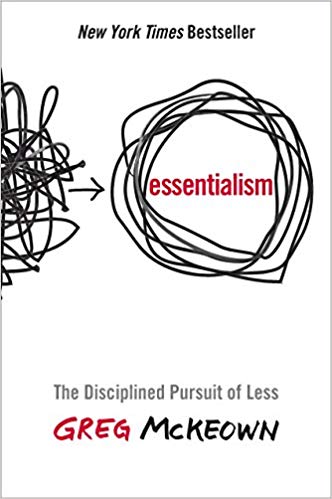Is minimalism the key to a happy, care-free life? According to these people, yes! Famous CEOs, organization experts, and even actors live by these techniques to lead simple, minimalistic lives. Want to follow in their footsteps and declutter your life? Keep reading!
Today, we’re bringing you 13 life tips and tricks from the world’s most famous minimalists. Let’s get started!

Essentialism
by Greg Mckeown
⏱ 15 minutes reading time
🎧 Audio version available
Simplify Complexity
“Simple can be harder than complex: You have to work hard to get your thinking clean to make it simple. But it’s worth it in the end because once you get there, you can move mountains.”
Steve Jobs credits a lot of success to his minimalist lifestyle. Even Apple products are known for their simple designs and intuitive software. His motto was always to “simplify complexity.” He applied this philosophy not only to his business, but also to his home.
In an interview, former Apple CEO John Scully once said,
“I remember going into Steve’s house and he had almost no furniture in it. He just had a picture of Einstein, whom he admired greatly, and he had a Tiffany lamp and a chair and a bed. He just didn’t believe in having lots of things around, but he was incredibly careful in what he selected.”
Give Up Luxury to Quiet the Mind
This little nugget of advice belongs to American essayist Henry David Thoreau, who was a famous poet, philosopher, and a dedicated minimalist. He liked to write about the life-changing benefits of leading a simple life and how giving up luxuries brought him peace.
He said,
“Cultivate poverty like a garden herb, like sage. Do not trouble yourself much to get new things, whether clothes or friends. Things do not change, we change. Sell your clothes and keep your thoughts.”
Give to Charity
Leonardo DiCaprio is a Hollywood legend. Having appeared in numerous iconic movies such as Titanic, The Wolf of Wallstreet, The Great Gatsby, and others, you would think he has a fleet of cars, a plethora of mansions around the world, and more worldly possessions than he could handle, but that’s far from the truth.
Yes, DiCaprio does cash in those big cheques. However, he approaches spending them in a minimalist way. His drive is to protect the environment, so he constantly donates to environmental charities. You won’t find him driving a Lamborghini any time soon either. His preferred vehicle is a Toyota Prius.
Keep a Minimalist Wardrobe
The founder of Facebook has a rule that he lives by,
“I think a simple rule of business is, if you do the things that are easier first, then you can actually make a lot of progress.”
Now, Mark Zuckerberg’s form of minimalism mainly manifests in the way he dresses. He’s famous for wearing various versions of the same shirt, jeans, and sneakers. Why does he do that when he’s one of the top ten richest people in the world?
He says it’s because he wants to clear his life and use his decision making power to serve this community instead of his clothing. Zuckerberg feels he’s not doing his job if he spends his energy on things that are, as he says it, “silly or frivolous.” If that means wearing essentially the same thing every day, then so be it. Steve Jobs does the same with his infamous turtlenecks.
Ask Yourself If You Really Need These Items
One day, Mad Men actor Vincent Paul Kartheiser, who plays Pete Campbell, found himself returning from a Golden Globes event. He grumbled,
“They just give you stuff. You don’t want it. You don’t use it.”
So one day, he looked around and realized that he just didn’t want this stuff anymore. He started giving away the things he didn’t need to friends and charity stores. If he found something still in its box, he would sell it. If he liked it, he kept it. Eventually, he enjoyed giving away stuff so much that he doesn’t really buy new things anymore. He’s one of the few select Hollywood stars who don’t own a car.
Get Rid of Papers
This advice comes from the minimalist queen herself, Marie Kondo. She believes that a life hack to declutter your space is to give up on paper.
Everyone is guilty of paper hoarding, of opening a bill, and then shoving the paper into a drawer– never to see the light of day again. You don’t need to keep these past papers, old warranties, etc. That single piece of paper will grow into a stack, and stacks become clutter.
The solution? Other than regularly decluttering your drawers, take the online route. Many billing companies have the option of sending you bills online.
Mementos Aren’t the Same As Memories
Another golden piece of advice from Marie Kondo is this: don’t confuse mementos with memories. Oftentimes, people save little scraps and mementos because they’re afraid to throw them away, and by association, lose the memory. Marie Kondo has the solution to this problem.
“There is no need to worry. Truly precious memories will never vanish even if you discard the objects associated with them.”
She says that keeping mementos can actually hold you back from moving into the future. You can’t keep living in the past. You should be living for yourself, not for your past self, and not for a future stranger. The “joy and excitement” you feel here and now are more important.
The Hanger Flip Technique
Struggling to keep a minimalist mindset with your wardrobe? Lifestyle expert Melissa Garcia has the answer for that: the hanger flip technique. Organize your wardrobe like this: make all your clothes hangers face one way. Every time you wear something, put it back on the hanger, but facing the opposite direction.
A month down the line, or six months, or even a year later, check which hangers have’t been flipped. Now, you know what you never wear and can get rid of.
There is a Place for Everything
Professional organizer Deanne Sharp firmly believes that the key to living a happy, organized life is this motto: there is a place for everything.
However, it takes a little organizing to find spots for your items. A good start would be keeping your floors tidy. She advises avoiding placing things, such as shoes and school bags, on the floor.
The Art of Gift Giving
If you’re someone who love giving and receiving gifts over the year and on each and every holiday, you’ll find yourself accumulating a lot of stuff you don’t really need.
Minimalist expert, Joshua Becker, believes that there is an art to gift giving. The perfect, most precious gifts don’t necessarily need to be the biggest or the most expensive. He believes that there are other ways to express our love and affection without giving physical objects. What are they?
“The gift of time, the gift of experiences, the gift of food or drink, and gifting opportunities to grow.”
Refuse Extra Space
People often believe that living in massive mansions is attractive. And most of the time, people’s living spaces are a lot bigger than they need to be. But, do you know what will happen if you have more space than you need? Naturally, that extra space will be filled with things they don’t need. And hey, more space means more cleaning.
Take a look for Warren Buffett, one of the richest people in the world with a net worth of over $80 billion. He can afford to buy whole neighborhoods, but he chooses to live in a five bedroom home that he bought in the 50s, just large enough for his family.
Buy One, Get Rid of One
As a general rule of thumb between minimalists, for every new object you buy, get rid of something you already own.
While Marie Kondo advises upgrading to the better version of a thing, it’s important not to keep all the old ones. This applies to anything from your clothes and shoes to electronics and furniture. By keeping a minimalist mindset, you’re not saying “no” to shopping. You’re saying “yes” to a clutter-free space.
Focus on What Gives You Joy
And what better trick to leave you with than Marie Kondo’s most famous trick? Focus on the things that give you the most joy.
Ask yourself if the item in front of you gives you happiness; if it doesn’t, get rid of it.
What Is Snapreads?

With the Snapreads app, you get the key insights from the best nonfiction books in minutes, not hours or days. Our experts transform these books into quick, memorable, easy-to-understand insights you can read when you have the time or listen to them on the go.


